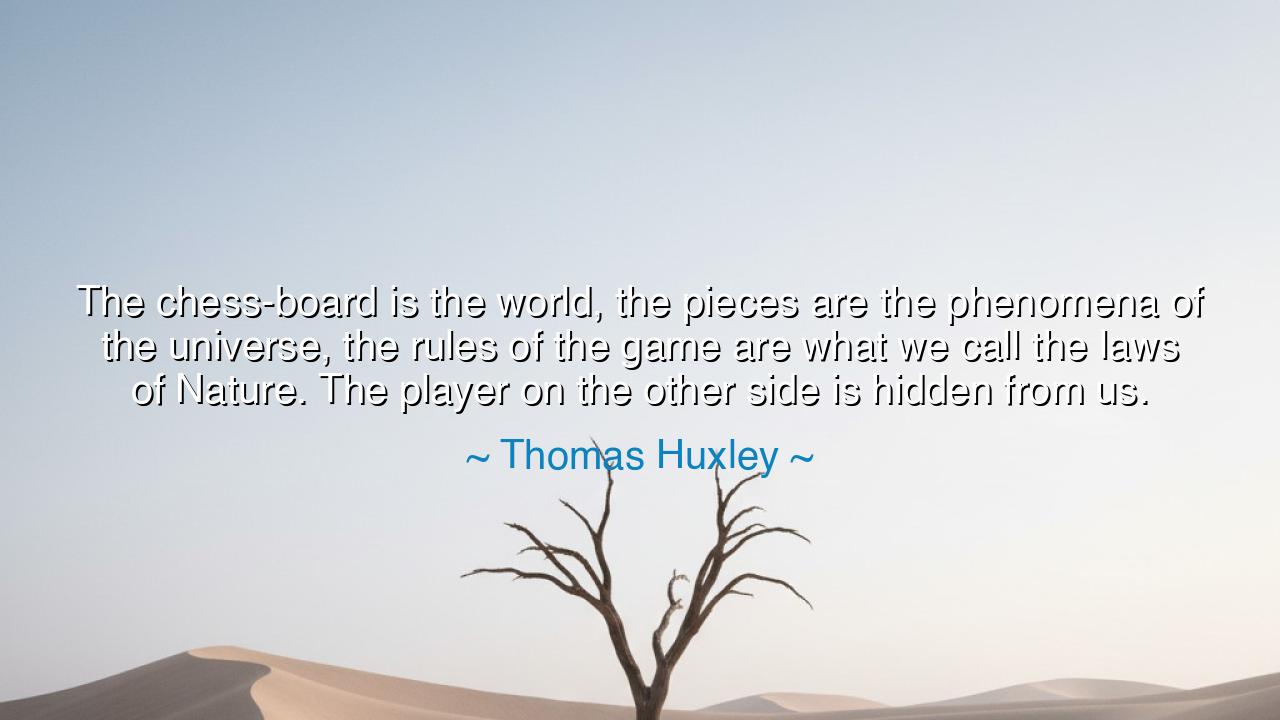
The chess-board is the world, the pieces are the phenomena of
The chess-board is the world, the pieces are the phenomena of the universe, the rules of the game are what we call the laws of Nature. The player on the other side is hidden from us.






Hear the voice of Thomas Huxley, the defender of science and champion of reason, as he declares: “The chess-board is the world, the pieces are the phenomena of the universe, the rules of the game are what we call the laws of Nature. The player on the other side is hidden from us.” In these words he casts the veil aside and shows us existence itself as a game of both order and mystery. The chess-board is no mere board of black and white squares, but the stage of creation upon which all beings move. The pieces are the stars, the storms, the beasts, and even we ourselves, shifting and colliding in patterns beyond our sight. The laws of Nature are the rules — invisible yet unyielding — that govern every motion, binding the smallest atom and the greatest sun alike. And yet, the hidden player — that force, that mind, or that enigma — remains beyond our reach, unseen but ever-present.
To grasp this truth is to feel both wonder and humility. For man, with all his intellect, may learn the moves of the pieces, may study the openings and endings of the game, yet the one who makes the opposing moves never reveals His hand. We can watch the knight leap, the bishop glide, the queen dominate the board — we can map the planets, split the atom, and harness the lightning — but still the unseen adversary plays on, unbending, implacable. This is the paradox of existence: we know the laws, but not the Lawgiver.
Consider the tale of Isaac Newton, who beheld an apple fall and from it discerned the law of gravity. He uncovered one of the great rules of the cosmic game, and men marveled that the same principle that brings fruit to earth binds the moon to its orbit. Yet Newton himself confessed that while he could calculate the motions of the heavens, he could not fathom the mind behind them. He was but a child, he said, playing on the shore, finding smoother pebbles while the great ocean of truth lay undiscovered before him. Here we see Huxley’s teaching: that man may master the pieces, but the hidden player remains cloaked.
And yet, O listeners, we must not despair at this hiddenness. For it is in the very mystery that man finds purpose. If all were known, if the opponent revealed his face and moves, then the game would lose its meaning. But in striving to understand, in laboring to master the rules, in daring to face the unseen, man becomes greater. The struggle itself ennobles him. Like Prometheus who stole fire, or Galileo who braved persecution, those who wrestle with the mysteries of nature bring light to the world, even if the ultimate hand that moves the cosmos is never grasped.
See also the story of Alan Turing, who in the dark days of war sought to break the codes of the enemy. He sat before a machine of cogs and wheels, studying its logic, its moves, its hidden strategies. Though the adversary remained unseen, Turing’s mastery of rules and patterns saved countless lives and hastened the end of tyranny. Is this not the same as Huxley’s vision? The game is always being played, the moves are real, and though the ultimate player remains in shadow, our duty is to learn, to act, to bring order from the mystery.
The lesson, children of the future, is thus: never cease to study the rules of Nature, for in them lies the key to survival and greatness. Yet do not let pride swell your heart, for the unseen player humbles even the wisest. Approach knowledge with courage, but also with reverence. For to know the rules is not to master the game entire — it is to play with dignity in the face of the unknown.
Therefore, let us adopt these practical actions: Observe the world with unceasing curiosity, as though every falling leaf, every star’s light, every human heartbeat is a move upon the chess-board. Learn its patterns, honor its laws, and use this wisdom not for cruelty but for the betterment of mankind. At the same time, carry humility like a shield, remembering that beyond your knowledge lies the infinite. Strive boldly, but bow quietly before the mystery.
So remember the words of Huxley: the world is a chess-board, the laws of Nature are the rules, and the hidden player will not show his face. Yet this is no reason for fear, but for awe. Play well the part given to you, honor the game, and though the unseen opponent may always prevail, your moves shall not be in vain. For in playing with wisdom and courage, you become not merely a piece upon the board, but a witness to the grandeur of the game itself.






AAdministratorAdministrator
Welcome, honored guests. Please leave a comment, we will respond soon